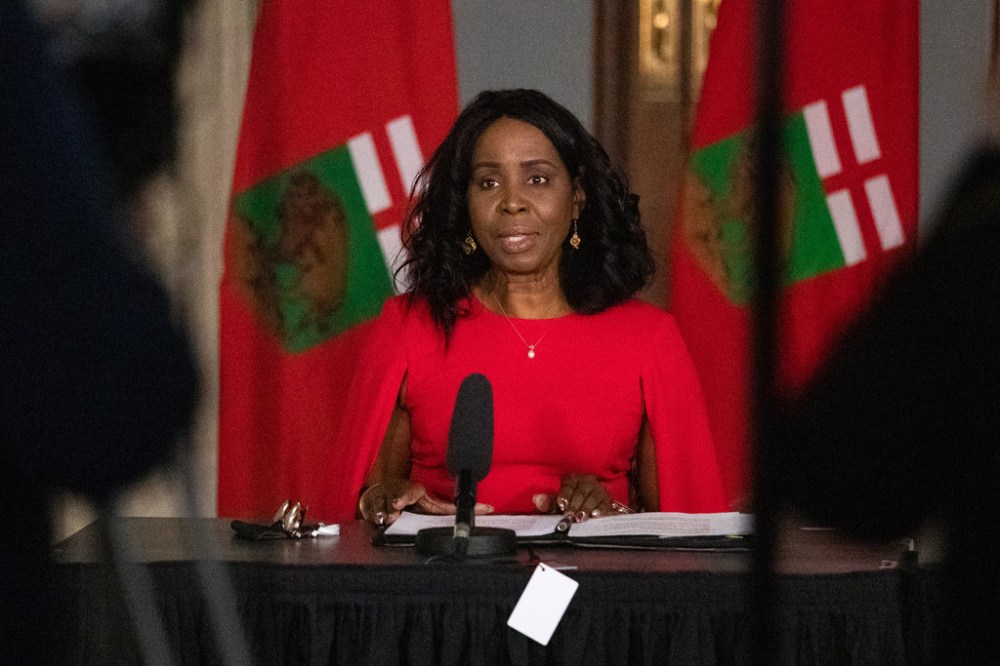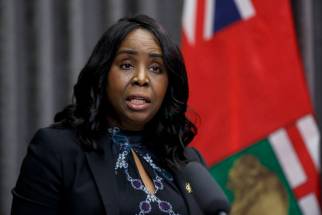Unhealthy decision Stefanson sends clear message to Manitobans by keeping Gordon as health minister
Read this article for free:
or
Already have an account? Log in here »
To continue reading, please subscribe:
Monthly Digital Subscription
$0 for the first 4 weeks*
- Enjoy unlimited reading on winnipegfreepress.com
- Read the E-Edition, our digital replica newspaper
- Access News Break, our award-winning app
- Play interactive puzzles
*No charge for 4 weeks then price increases to the regular rate of $19.00 plus GST every four weeks. Offer available to new and qualified returning subscribers only. Cancel any time.
Monthly Digital Subscription
$4.75/week*
- Enjoy unlimited reading on winnipegfreepress.com
- Read the E-Edition, our digital replica newspaper
- Access News Break, our award-winning app
- Play interactive puzzles
*Billed as $19 plus GST every four weeks. Cancel any time.
To continue reading, please subscribe:
Add Free Press access to your Brandon Sun subscription for only an additional
$1 for the first 4 weeks*
*Your next subscription payment will increase by $1.00 and you will be charged $16.99 plus GST for four weeks. After four weeks, your payment will increase to $23.99 plus GST every four weeks.
Read unlimited articles for free today:
or
Already have an account? Log in here »
Hey there, time traveller!
This article was published 18/01/2022 (1422 days ago), so information in it may no longer be current.
Premier Heather Stefanson gave Health Minister Audrey Gordon a strong vote of confidence Tuesday, even as COVID-19 hospitalizations hit a new peak and Manitoba’s hospital system took another step toward utter collapse.
She kept her on as health minister. It was a major mistake that could come back to haunt the rookie premier less than two years from now.
Stefanson announced her first major cabinet shuffle since becoming premier in November. She made changes to key portfolios, including in finance and justice. As expected, Stefanson brought back the labour portfolio (eliminated by former premier Brian Pallister), installing Reg Helwer as minister of labour, consumer protection and immigration. She also put a new face in education, appointing Wayne Ewasko as minister of education and early childhood learning.
Her fatal error was not replacing Gordon. Health is always the most important portfolio in cabinet. But it’s even more important for the Tories right now. Their performance in health over the next 21 months will likely make the difference between winning or losing the next provincial election, scheduled for October 2023.
Voters, especially in Winnipeg, have lost confidence in the Tories’ ability to manage the health-care system. After a bungled hospital consolidation plan that began in 2017, the Progressive Conservative government failed over the past two years to add enough capacity to the hospital system to handle the influx of COVID-19 patients. Instead, tens of thousands of surgeries have been cancelled to redeploy hospital staff, and patients are regularly shipped out of Winnipeg to remote communities because they can’t be cared for in the capital.
Outside experts in infectious disease and medicine have repeatedly called on the government to bring in public health measures to protect hospital capacity, including over the past several weeks, yet the Tory government has refused.
When senior officials in public health were asked recently if they recommended more stringent public health measures, they declined to answer. Stefanson, during a news conference last week, attempted several times to prevent Dr. Jazz Atwal, the deputy chief provincial public health officer, from answering that question.
When asked a similar question three weeks ago during an online media briefing, Shared Health CEO Adam Topp also refused to answer. A government moderator abruptly ended the briefing when a reporter pressed for more answers.
It’s pretty clear experts inside and outside government have urged the health minister in recent weeks to take steps to protect hospital capacity. She refused. We are now seeing the consequences of that inaction.
Under Gordon’s watch, Manitoba Health also refused to make vaccines mandatory for personal care home staff, mishandled the distribution of rapid antigen tests and failed to provide the public with accurate vaccine data to show the effectiveness of immunization.

With COVID-19 patients piling up in hospitals and seemingly no plan in place to address it, no position in cabinet cried out for change more than the health portfolio.
Despite that, Stefanson stuck with the status quo. By doing so, she sent a clear message to Manitobans: she is satisfied with the way health care is being managed.
Stefanson had an opportunity to put her stamp on health care by appointing a new minister and taking a fresh approach to managing the system. Instead, she stuck with a minister who was appointed by her predecessor — an unpopular former premier whose handling of the health file was disastrous.
Stefanson had options. Tory MLA Eileen Clarke, one of the most respected members of caucus who returned to cabinet as municipal relations minister (not a major cabinet post), would have been a good choice.
Stefanson praised Clarke Tuesday as “one of the most capable individuals I’ve met in my life.”
Cabinet ministers Ewasko or Derek Johnson could have fit the bill.
When things aren’t going well in any area of government, premiers usually shuffle in a new minister to signal a change in direction. Clearly, things are not going well in health. Stefanson’s failure to recognize that will likely have long-term implications for her government and for Manitobans.
tom.brodbeck@freepress.mb.ca

Tom has been covering Manitoba politics since the early 1990s and joined the Winnipeg Free Press news team in 2019.
Our newsroom depends on a growing audience of readers to power our journalism. If you are not a paid reader, please consider becoming a subscriber.
Our newsroom depends on its audience of readers to power our journalism. Thank you for your support.








